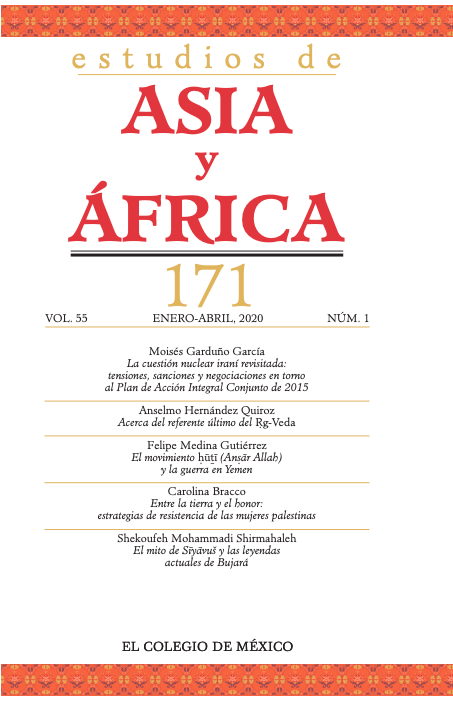Resumen
Mahmūd Darwīš (1941-2008) nació en la pequeña villa palestina de al-Birwah, la cual se localizaba al oeste de Galilea, a unos cuantos kilómetros del puerto de ’Akka (San Juan de Acre). Sin lugar a dudas, este poeta es una de las figuras más relevantes de la poesía y la literatura contemporáneas de Palestina. Un autor aclamado dentro y fuera del mundo árabe, que influyó significativamente en la instauración de la identidad de Palestina luego del establecimiento del Estado de Israel (Saith, 2005; Yeshurun, 2012, pp. 46-70). Asimismo, es un referente sin igual para el estudio de la literatura árabe moderna y uno de los escritores árabes más traducidos de la actualidad, al menos a veinte idiomas. Su trabajo fue mundialmente reconocido con numerosos galardones, entre los que destacan el Lenin Peace Prize de la Unión Soviética en 1983, el grado de commandeur de la Ordre des Arts et des Lettres de Francia en 1997, el Lannan Cultural Freedom Prize de Estados Unidos en 2001, y el Pre¬mio Príncipe Claus de Holanda en 2004 (Mahmoud Darwish Foundation and Museum, 2008a).Referencias
Alshaer, A. (2011). Identity in Mahmoud Darwish’s poem ‘The dice player’. Middle East Journal of Culture and Communications, 4(1), 90-110. https://doi.org/10.1163/187398611X553670
Antoon, S. (2002). Mahmud Darwish’s allegorical critique of Oslo. Journal of Palestine Studies, 31(2), 66-77. https://doi.org/10.1525/ jps.2002.31.2.66
Attar, F. (2015): El lenguaje de los pájaros (Trad. C. Janés y S. Garby). Madrid: Alianza.
Darwish, M. (2001a). Ğidāriyyah [Mural], 2ª ed. Beirut: Dār Riyyād ar-Rayyis.
Darwish, M. (2001b). Menos rosas (Trad. y pról. M. L. Prieto). Madrid: Hiperion.
Darwish, M. (2003). Mural (Trad. Rosa Isabel Martínez Lillo). Madrid: Ediciones Oriente y del Mediterráneo.
Darwish, M. (2005). Ka-Zahr al-lawz ’aw ’Ab’ad. [Como la flor del almendro o más allá]. Beirut: Riad El-Rayyes.
Darwish, M. (2 de julio de 2008). Lā‘ibu ’n-Nard [El jugador de dados]. Al-Quds Al-’Arabī, 20(5934), 10. Recuperado de www. alquds.co.uk/pdfarchives/2008/07/07-01/All.pdf
Darwish, M. (2009) Lā ’urīdu li-hadī al-Qasīda ‘an tantahī, ad-Dīwān al-’Ahīr Mahmūd Darwīš, Nushatu ‘an dār Riyyad ar-Rayyis li-našra, at-Tμabi‘atu al-’ūlā. [No quiero que este poema termine. Último poemario de Mahmūd Darwīš]. Beirut: Libros Riad
Farsakh, L. (2009). Darwish and the meaning of Palestine. Human Architecture: Journal of the Sociology of Self-Knowledge, 7(5), 101- 104. Recuperado de scholarworks.umb.edu/humanarchitecture/ vol7/iss5/25/
Flapan, S. (1987). The Palestinian exodus of 1948. Journal of Palestine Studies, 16(4), 3-26. https://doi.org/10.2307/2536718
Fragopoulos, G. (7 de diciembre de 2009). Tracing Mahmoud Dar-wish’s map. The Quarterly Conversation. Recuperado de http:// quarterlyconversation.com/tracing-mahmoud-darwishs-map
Ghannam, M. y El-Zein, A. (2009). Reflecting on the life and work of Mahmoud Darwish (cirs Brief núm. 3). Center for International and Regional Studies, Georgetown University School of Foreign Service in Qatar. Recuperado de http://www.files.ethz.ch/ isn/97407/No_3_Reflecting_on_the_Life_and.pdf
Gómez Alonso, J. C. (1997-1998). Amado Alonso en el desarrollo de la poética formal hispánica. Cauce. Revista de Filología y su Didáctica, (20-21), 75-92. Recuperado de https://cvc.cervantes. es/literatura/cauce/pdf/cauce20-21/cauce20-21_07.pdf
Heidegger, M. (2010). Caminos de bosque (Trad. H. Cortes y A. Leyte). Madrid: Alianza.
Joudah, F. (2009). Mahmoud Darwish’s lyric epic. Human Architec¬ture: Journal of the Sociology of Self-Knowledge, 7(5), 7-18. Recuperado de http://scholarworks.umb.edu/humanarchitecture/ vol7/iss5/5/
Khoury, E. (2009). Hμikāyyah ad-Dīwān al-’Ahīr li-Mahmūd Darwīš [Historia del último poemario de Mahmūd Darwīš]. al-Karmal, (90), 23-36. Recuperado de http://www.alkarmel.org/prenumber/issue90/target2.pdf
Mahmoud Darwish Foundation and Museum (2008a). Mahmoud Darwish’s Biography. Recuperado de http://mahmouddarwish. ps/en/article/80000160/Mahmoud-Darwish---Biography
Mahmoud Darwish Foundation and Museum (2008b). About the museum. Recuperado de http://mahmouddarwish.ps/en/article/6/About-the-museum
Mahmoud Darwish Foundation and Museum (2008c). Original poetry manuscrips. Recuperado de http://mahmouddarwish.ps/en/category/1120/4/Original-Poetry-Manuscripts
Mena, E. (2009). The geography of poetry: Mahmud Darwish and postcolonial identity. Human Architecture: Journal of the So¬ciology of Self-Knowledge, 7(5), 111-118. Recuperado de http://scholarworks.umb.edu/cgi/viewcontent.cgi?article=1355&context=humanarchitecture
Prieto González, M. L. (2003). Mahmud Darwish. Poesiaárabe. com. https://www.poesiaarabe.com/biografia_de_mahmud_ darwish.htm
Prieto González, M. L. (2012). La urīd lihadī al-qasīda ‘an tantahī. Poemario póstumo de Mahmud Darwish. Hesperia. Culturas del Mediterráneo, 16 (Especial Portugal I), 273-282.
Said, E. W. (1994). On Mahmoud Darwish. Grand Street, 48, 112-115. https://doi.org/10.2307/25007730
Said, E. W. (2006). On late style: Music and literature against the grain. Nueva York: Pantheon Books.
Saith, A. (2005). Mahmoud Darwish: Hope as home in the eye of the storm. isim Review, 15(1), 28-29. Recuperado de https://openac-cess.leidenuniv.nl/bitstream/handle/1887/16977/ISIM_15_Ma-hmoud_Darwish_Hope_as_Home_in_the_Eye_of_the_Storm. pdf?sequence=1
Shatz, A. (2002). A love history between an Arab poet and his land: An interview with Mahmud Darwish. Journal or Palestine Studies, 31(3), 67-78. https://doi.org/10.1525/jps.2002.31.3.67
Shehadeh, R. (2002). Mahmoud Darwish by Raja Shehadeh. bomb, 81. Recuperado de www.bombmagazine.org/article/2520/ mahmoud-darwish
Sinan, A. (2002). Mahmud Darwish allegorical critique of Oslo. Journal of Palestine Studies, 31(2), 67-77. https://doi.org/10.1525/ jps.2002.31.2.66
Williams, P. (2012). ‘No aesthetics outside my freedom’. Mahmud Darwish and late style, Interventions, 14(1), 24-36. https://doi. org/10.1080/1369801X.2012.656930
Yeshurun, H. (2012). Exile is so strong within me, I may bring it to the land: A landmark 1996 Interview with Mahmoud Darwish. Journal of Palestine Studies, 42(1), 46-70. https://doi.org/10.1525/ jps.2012.XLII.1.46
Esta obra está bajo una licencia internacional Creative Commons Atribución-NoComercial-SinDerivadas 4.0.
Derechos de autor 2022 Estudios de Asia y África


